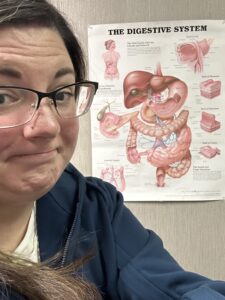Coping | Ostomy | Uncategorized

 In November 2023, I underwent a nuclear scan and discovered tumors in my pancreas, small intestine, colon, stomach, and rectum. They turned out to be carcinoid tumors, causing carcinoid syndrome, and making me very sick due to the excessive release of hormones. Carcinoid syndrome refers to a set of symptoms tied to tumors called carcinoids and the release of the hormone serotonin. It causes redness or a feeling of warmth in your face and neck called flushing, chronic diarrhea, difficulty breathing, and rapid heartbeat.
In November 2023, I underwent a nuclear scan and discovered tumors in my pancreas, small intestine, colon, stomach, and rectum. They turned out to be carcinoid tumors, causing carcinoid syndrome, and making me very sick due to the excessive release of hormones. Carcinoid syndrome refers to a set of symptoms tied to tumors called carcinoids and the release of the hormone serotonin. It causes redness or a feeling of warmth in your face and neck called flushing, chronic diarrhea, difficulty breathing, and rapid heartbeat.
My symptoms started around the summer of 2021, with severe episodes waking me up at night. I experienced cold sweats, extended bathroom trips with extreme diarrhea, and intense shaking.
It took three years and multiple doctors to get a diagnosis. My symptoms were initially dismissed as stress, anxiety, or Lupus-related IBS. Medical professionals went so far as to dismiss my rectal bleeding as hemorrhoids without even giving me a rectal exam.
Despite this pushback, I persisted because my symptoms were not normal. Nothing is normal about filling up a toilet full of bloody diarrhea. I had to beg for a colonoscopy.
After getting diagnosed with carcinoid tumors and syndrome in November, I was set up with multiple specialists. My medical team and I knew almost immediately that the most pressing tumors were the ones found in my pancreas and rectum because they were causing a lot of symptoms. I went in for my consultation with the colorectal surgeon and had a polypectomy as part of a rectal biopsy. He removed not one, but two polyps. My biopsy came back grade 1, which means the cells divide at a low rate and grow slowly, and “well differentiated,” which means they look more like healthy cells. This confirmed what my doctor suspected: my tumors were growing very slowly!
My standardized treatment is my monthly Octreotide injections that help stop the release of the hormones from my tumors, and control my symptoms associated with the hormones. It also suppresses the tumor growth. I am additionally on weekly steroid suppositories and am supposed to start a 6-week course of oral chemo and lots of surveillance.
My polypectomy removed all my polyps, and as long as I stay symptom free we can delay my second surgery for now! 
At my last appointment, my doctor and I, talked in depth about me eventually having a stoma and an ostomy bag so they can remove the diseased parts of my small intestines and colon, and combine that with a proctectomy where my entire rectum and anus will be removed and sewn up permanently.
My doctor says I get a rare chance to prepare for my stoma when so many are thrust into this life-changing surgery. It’s not anything I’m rushing into. It will be permanent and irreversible, but we are starting the proper testing to see how many diseased sections I have compared to healthy ones and we are going to go from there. We don’t know if I’m looking at months or years. But for now, I have my bionic rectum to help.
It took me two years to get a concrete diagnosis. A diagnosis I had to fight for every step of the way. My rectal tumors had all that time to grow and being left untreated ended up causing me a cascade of other issues.
Growing up, we’re taught doctors are prestigious individuals. They go to school for a very long time and have a highly respected position. We listen to them and put our health and lives in their hands, without question. But, we as patients aren’t “lesser” than them and shouldn’t be dismissed, gaslighted, or made to be inferior about our health just because we don’t have a medical degree. We know OUR bodies better than anyone else. Standing up for myself, advocating at my appointments, and saying “no” has made me feel in charge, (as I should) of my health! If a doctor/medical professional doesn’t vibe right with you, you can leave, not follow up, or request a new one and that’s something I didn’t know I could do or was too scared to do. Now, it’s the best thing I could do for my health.
I am no stranger to medical gaslighting. I was constantly being told, “you’re too young,” and I never felt like my symptoms were taken seriously. I want to stress that being an advocate for yourself, no matter how scary it is, is the best thing you can do for yourself! It is YOUR health, after all. I know I grew up respecting doctors because that’s what I was taught and I didn’t understand until I was an adult that advocating for yourself isn’t disrespectful.
Here are some signs of medical gaslighting from medical professionals to be on the lookout for:
How can you be an advocate for yourself?
Editors Note:
For more on medical gaslighting check out the article “Medical Gaslighting: No, It’s Not Just in Your Head” from Everyday Health.
 Rachel resides in Cleveland, Ohio with her husband and their 3 kids. Not too far behind her is always her corgi, Odin and her 2 cats Toby and Arlo. Rachel completed Disney College of Knowledge in 2022 and is a Travel Agent who specializes in Disney vacation planning. She loves reading and most often can be caught with her kindle in her hand!
Rachel resides in Cleveland, Ohio with her husband and their 3 kids. Not too far behind her is always her corgi, Odin and her 2 cats Toby and Arlo. Rachel completed Disney College of Knowledge in 2022 and is a Travel Agent who specializes in Disney vacation planning. She loves reading and most often can be caught with her kindle in her hand!